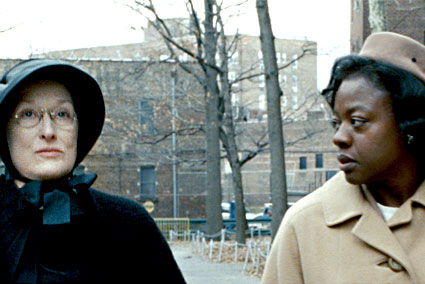Notwithstanding its awards (a Pulitzer, a Drama Desk, a Tony), I boycotted John Patrick Shanley’s 2004 play, Doubt. Who wants to see more Catholic bashing? But when a producer friend invited me to watch a “screener” (an early DVD copy for Oscar consideration) of the film version, I had no excuse not to see it.
My initial reluctance was due, on the one hand, to Mr. Shanley’s reputation for haughtiness – not one word of his screenplays may be changed! (no issue when the screenwriter is also the director) – and, on the other hand, to the subject of Doubt, which, at one level anyway, is pederasty in the priesthood. More than that, I should not write about the movie itself, but I now regret not earlier facing down my skepticism and seeing the play, since Mr. Shanley’s treatment is forthright. Doubt is neither particularly anti-Catholic nor especially didactic, even if in interviews Shanley’s description of his “politics” is, for me, cringe-making. In fact, Doubt is as good a film as I’ve seen in quite a while, in terms of the sharpness of its dialogue, the artfulness of its pacing, and the remarkable performances of its actors.
Philip Seymour Hoffman as a priest, Fr. Flynn, Amy Adams as a young Sister of Charity and a teacher at St. Nicholas School in the Bronx, circa 1964, and especially Viola Davis as the mother of a student who may or may not have been abused by Flynn . . . and, yes, Meryl Streep as Sister Aloysius, principal of the school. After such moralizing duds as Rendition and Lions for Lambs, I’d all but given up on the “greatest actress of our generation,” but Doubt belongs to Ms. Streep – except for the scene she shares with Ms. Davis, whose role is too short to say she steals the movie, but it is marvelous to see the older actress, the soon to be twelve-time Oscar nominee, graciously stand back as Ms. Davis commands the screen. That said, this is the best Meryl Streep has ever been – and that’s saying something.

As critic John Simon described Sister Aloysius in his review of Doubt’s theatrical incarnation, she is “the heavy of the play – though not, however, its villain.” Shanley has said that Doubt is not really about abuse or the Church or priests or nuns, but – as the title states – doubt, which he considers almost salvific. (Dubito ergo sum, would it be?) I’m not sure if he means it, but Shanley is apparently convinced that certainty is the enemy of humanity; that confessing our doubts, not our sins, is what gives us such rectitude as we may have in this life.
But Mr. Shanley must be certain about some things (his own work one would suppose), although I’m not sure he’s right to say Doubt, which is subtitled “A Parable,” isn’t really about the Church’s sex-abuse crisis. Arthur Miller claimed The Crucible wasn’t really about the Salem Witch Trials and “McCarthyism” was surely on Miller’s allegorically inclined mind as he wrote, although his appearance before the House Un-American Activities Committee and his citation for contempt of Congress came several years after the play had its premiere. (This hasn’t stopped a generation of pedants from teaching those events as background to the play.)
There’s a tradition of sorts of playwrights saying the subject of a play isn’t really the subject of a play, but Miller pored over the actual 1692 trial transcripts, and I suspect Shanley may be reading President Bush’s decision to invade Iraq (a frequent digression in his interviews) back into the truer and simpler genesis of his story: the powerlessness of people, not least nuns, in the face of priestly abuse – and the devastating effects these abuses and the cover-ups of them had on the faithful. This is the way the film ends. And how could the faithful not at least doubt the Church – and perhaps the faith upon which it is built – not only when priests molest children but also when the offenders are shuttled from one parish to another?
I was an adult – age twenty-five – when I became a Catholic, but in the first year after my conversion I was twice propositioned by priests. I kicked the dust from my sandals, so to speak, and never again set foot in those churches, and I have met so many fine priests, decent and holy men, that those incidents didn’t scuttle my new-found faith. But it seems to me that Shanley, who dedicates his film to one of the nuns who taught him when he was a schoolboy, is among the many deeply affected by the scandals. He might have framed the film with Mark 9:42: “And if anyone causes one of these little ones who believe in me to sin, it would be better for him to be thrown into the sea with a large millstone tied around his neck.”














